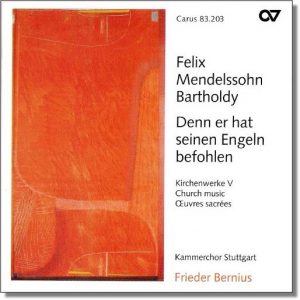Felix Mendelssohn was born into a prominent Jewish family in 1809. His grandfather, Moses Mendelssohn, was one of the most prominent Jewish intellectuals of the Enlightenment. But in 1816, Felix and his three siblings were all baptized into the Christian faith at his parents request by a Reformed Protestant minister in Berlin. As a young man, Felix would later disclose that he had become a follower of the Prussian Protestant theologian Friedrich Schleiermacher. Neither his baptism nor his numerous compositions of Christian sacred music were mere formalities.
The best-known of his sacred choral works are the larger, longer, concert-sized works, especially the oratorio Elijah (1846). But there are many shorter works, some of them suitable for use in liturgical settings. Between 1983 and 2008, the Kammerchor Stuttgart (Stuttgart Chamber Choir) under the direction of Frieder Bernius has been recording the complete catalog of Mendelssohn’s sacred choral music. It fills 12 volumes (on CD, some volumes require 2-disks), which is an imposing mountain of music to engage.
 Volume 5 is the one of the 12 that I’ve listened to most, in part because it features a performance of a piece our choir has sung, Aus tiefer not, Mendelssohn’s Bach-like setting of Martin Luther’s metric paraphrase of Psalm 130. This piece was published by Mendelssohn with two companions, a setting of Ave Maria and one of another Luther text, Mitten wir im Leben sind (“In the Midst of Life we are in Death”), the Reformer’s re-working of an eleventh-century Latin antiphon, Media vita in morte sumus.
Volume 5 is the one of the 12 that I’ve listened to most, in part because it features a performance of a piece our choir has sung, Aus tiefer not, Mendelssohn’s Bach-like setting of Martin Luther’s metric paraphrase of Psalm 130. This piece was published by Mendelssohn with two companions, a setting of Ave Maria and one of another Luther text, Mitten wir im Leben sind (“In the Midst of Life we are in Death”), the Reformer’s re-working of an eleventh-century Latin antiphon, Media vita in morte sumus.
Late in his short life, Mendelssohn wrote his version of the Deutsche Liturgie, the traditional Protestant reworking of the pre-Reformation Ordinary of the Mass. There are ten short works in this collection, the three longest of which are on this recording. They are a Kyrie, Ehre sei Gott in der Höhe (the German version of the Gloria), and Heilig (the German Sanctus). These are each written for eight unaccompanied parts and have a stirring richness that combines power and reverence.
One of the longer pieces on the recording is the Responsorium et Hymnus (also known as Vespergesang). This is a sequence of five Latin hymns for male chorus accompanied by cello and double bass. The texts are from the Psalms, the book of Daniel, and St. Ambrose (his vespers hymn O Lux beati Trinitas). In between each of the hymns, Mendelssohn inserts short phrases adapted from traditional Gregorian chant sung by single voices.
Also included on this recording is Mendelssohn’s a cappella setting of Psalm 100, Jauchzet Dem Hernn, Alle Welt, and Denn er hat seinen Engeln befohlen uber dir, a text from Psalm 91:11-12, “For he shall give his angels charge over thee to keep thee in all thy ways.” Mendelssohn later adapted this a cappella motet in Elijah, adding a full orchestral accompaniment. The more delicate setting without instruments on this recording is less operatic and more liturgical in spirit.
Finally, the Kammerchor sings the Sechs Sprüche zum Kirchenjahr (Six Anthems for the Liturgical year), settings of verses from the New Testament and the Psalms commissioned by King Friedrich Wilhelm IV. There are pieces for Advent, Christmas, New Year’s Day, Passiontide, Good Friday, and Ascension Day. Written for eight a cappella parts, they each conclude with an heartfelt “Hallelujah,” sometimes exuberant, sometimes more pensive (even the Passiontide and Good Friday pieces include Hallelujahs; the King was a Reformed Protestant, not a Lutheran, so was not as scrupulous about refraining from singing Hallelujahs during Lent).
This collection of music runs just over an hour. The performances are all crisp and restrained without being cool and the recordings are neither too reverberant nor too intimate. Unless your German is accomplished, I would recommend listening with a translation in front of you. This is not background music, as lovely as it sounds. Beauty and truth have a way of making demands, for which we can be eternally grateful.